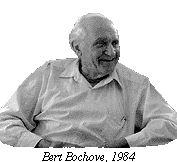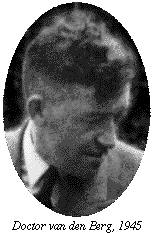BERT BOCHOVE TELLS HIS STORY (Continued)
 BERT BOCHOVE: I always had the feeling that without Kets de Vries, Kappelhof and Dr. van den Berg, a lot of things would have gone wrong. Kets de Vries was a super smart man; he always did just as he pleased. One time he told everyone, "I have to go to
Westerbork
(the German concentration camp in Holland from which Jews were deported to Auschwitz) to show the National Socialists running around here that they cannot take me; they need to understand that." I told him he was crazy.
BERT BOCHOVE: I always had the feeling that without Kets de Vries, Kappelhof and Dr. van den Berg, a lot of things would have gone wrong. Kets de Vries was a super smart man; he always did just as he pleased. One time he told everyone, "I have to go to
Westerbork
(the German concentration camp in Holland from which Jews were deported to Auschwitz) to show the National Socialists running around here that they cannot take me; they need to understand that." I told him he was crazy.
For a couple of days he was gone; I didn't know where he was. Then he came back, and everything was normal again. Later, I thought it over and realized he fooled us all. No other Jews were coming back from Westerbork. He never went anywhere, of course--just stayed in his house--and that way he got the Dutch National Socialists off his back.
Kappelhof, the distribution man, brought a lot of people to our house, including Meyer and his son. Ans said that at one time we had twenty-six people. Of course, that included my mother-in-law, my wife, and baby Erik, and maybe my sister and youngest brother, Kees, who came to us when the war got worse, but most of them were Jewish people. With so many women around, Annie never had to clean, or look after the house; they were glad to help. When you have bad years behind you, and so much to worry about, the more you have to do, the better.
 Dr. van den Berg came to our house very often. He took care of all the Jews in the community and never wrote out a bill, a very special man. No one in our house actually got sick, but they often had complaints, and if he was in the neighborhood he would come by and give them something. I think sometimes they were happy to have an ailment just so the doctor would come.
Dr. van den Berg came to our house very often. He took care of all the Jews in the community and never wrote out a bill, a very special man. No one in our house actually got sick, but they often had complaints, and if he was in the neighborhood he would come by and give them something. I think sometimes they were happy to have an ailment just so the doctor would come.
Henny had a baby while she was in our house. That happened, too. It was less than a year after Erik, our first child, was born. We brought her to the hospital where Annie gave birth to Erik. To be safe, the doctor didn't record the baby's birth until after the war was over, so Marion is actually older than her birth certificate says.
We were friends with the Sickens family, who lived in a little house close by that belonged to a doctor. Sickens was a journalist for a Dutch newspaper. They paid no rent--they were that poor--and the doctor didn't go after it; he was happy enough to have a tenant, because otherwise his place would have been broken up for firewood. Every house that wasn't in use was torn down that winter for stove wood. The house was in a little forest, an ideal place to put a mother and young baby. So Pam, Henny and the baby moved in there, and Sickens' wife took the very best care of them until the war was over.
Pam had been writing some stories he wanted to publish. He went to a man in town who printed underground things, and talked him into doing it. Borrowing the man's typewriter, Pam typed it all out, and it was printed: a little book, in Dutch, and there was not a good word for the Germans in the whole thing. I kept a few hundred in stock that I sold under the counter for one and a half guilders. Pam kept about three hundred copies at Sickens' place.
One morning, looking out, we saw two Germans roaming down the street, and then a moment later Pam passed by pulling a little four-wheeled cart behind him. On the cart were all the books and the typewriter. I thought, "Oh, Pam Juliard looks scared!" There was a raid on the outskirts of town that day, and before he knew what was happening they were in his house. They picked him up along with his whole stock of books. They rounded up several other people as well, and brought them all to a cafe in the center of town, very close to us.
Now Pam's face was a little bit pronounced; he had blue eyes, but there was something typically Jewish about him. By then I was not an outsider anymore; over the years I learned to recognize certain things, like--especially when Jews are together--their accent has a little bit of Yiddish in it. The Amsterdam Jews especially, were very lively; they had all these interesting points of view. It could be about art, music--anything. I always recognized them as people with a certain blood in them. Pam, as blond and blue-eyed as he was, had that character. Still, the Germans were never smart in these things.
At that little cafe they questioned him. According to his papers, he was a seminary student, studying to become a minister. The people they were picking up were going to be sent for forced labor in Germany, but Pam, as a seminary student was supposed to be exempt. They weren't sure what to do, so they made him and some others they had picked up walk about twelve miles to the Queen's Summer Palace at Soest, now a German headquarters. The thing was, they forgot the books. The German fellow in Huizen had looked at one. He couldn't read Dutch, but he recognized the word "God." Pam told him it was about the Bible, and he believed him; but really it was a curse against the Germans. At the Summer Palace, they questioned him again, checked out his story, and let him go.
We were eating dinner that evening when Pam passed by our house again, on his way home to Henny. He was mad: after all that walking, he hardly had shoes left anymore.
I think he had quite a lot of guts, Henny too, and Ans--all of them. I have the deepest respect for them. It could have been the end of Pam's life. There are very few people like the Juliards. In the house, they could always settle disputes the right way, talk hate away, things like that. They are very wise.
Yes, it could have been the end of my life many times too, but I was slowly growing into it. It was like walking in a mine field; you're half way into it and all at once you recognize that you are in a mine field. What can you do? Keep walking.
After that episode I still sold the books in the store. It was a little dangerous, but I knew my customers, of course. When the war was over I still had a few copies. I have one or two around here somewhere; they're fairly small.
 Dr. van den Berg came to our house very often. He took care of all the Jews in the community and never wrote out a bill, a very special man. No one in our house actually got sick, but they often had complaints, and if he was in the neighborhood he would come by and give them something. I think sometimes they were happy to have an ailment just so the doctor would come.
Dr. van den Berg came to our house very often. He took care of all the Jews in the community and never wrote out a bill, a very special man. No one in our house actually got sick, but they often had complaints, and if he was in the neighborhood he would come by and give them something. I think sometimes they were happy to have an ailment just so the doctor would come.
 BERT BOCHOVE: I always had the feeling that without Kets de Vries, Kappelhof and Dr. van den Berg, a lot of things would have gone wrong. Kets de Vries was a super smart man; he always did just as he pleased. One time he told everyone, "I have to go to
Westerbork
(the German concentration camp in Holland from which Jews were deported to Auschwitz) to show the National Socialists running around here that they cannot take me; they need to understand that." I told him he was crazy.
BERT BOCHOVE: I always had the feeling that without Kets de Vries, Kappelhof and Dr. van den Berg, a lot of things would have gone wrong. Kets de Vries was a super smart man; he always did just as he pleased. One time he told everyone, "I have to go to
Westerbork
(the German concentration camp in Holland from which Jews were deported to Auschwitz) to show the National Socialists running around here that they cannot take me; they need to understand that." I told him he was crazy.